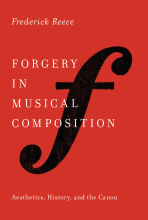The University of Washington Music History program hosts a book launch celebration and talk by assistant professor Frederick Reece upon the publication of his new book, Forgery in Musical Composition (Oxford University Press).
About the Book
We all know about art forgeries, but why write fake classical music? In Forgery in Musical Composition, Frederick Reece investigates the methods and motives of mysterious musicians who sign famous historical names like Haydn, Mozart, and Schubert to their own original works. Analyzing a series of genuinely fake sonatas, concertos, and symphonies in detail, Reece's study exposes the shadowy roles that forgeries have played in shaping perceptions of authenticity, creativity, and the self within classical music culture from the 1790s to the 1990s.
Holding a magnifying glass to a wide array of phony works, Forgery in Musical Composition explains how skillful fakers have succeeded in the past while also proposing active steps that scholars and musicians can take to better identify deceptive compositions in the future. Pursuing his topic from case to case, Reece observes that fake historical masterpieces have often seduced listeners not simply by imitating old works, but rather by mirroring modern cultural beliefs about innovation, identity, and meaning in music. Here forged compositions have important truths to tell us about knowing and valuing works of art precisely because they are not what they appear.
Biography

Frederick Reece studies music and sonic culture from 1789 to the present. Thematically, his research centers on issues of authorship and identity, and on sound’s conceptual intersections with the occult and supernatural.
Reece’s first book, Forgery in Musical Composition: Aesthetics, History, and the Canon, (Oxford University Press, 2025) traces the practice of compositional forgery—i.e., fraudulently signing famous historical names like Haydn, Mozart, and Schubert to one’s own original works—across two centuries of classical music culture, from the 1790s to the 1990s. At its core, the text contends that fake historical masterpieces are characteristic byproducts of the canon’s own internal logic, and that the most successful forgeries seduce us by mirroring deeply held cultural beliefs about authenticity, innovation, and meaning in music.
Further articles, reviews, and book chapters have appeared in such venues as the Journal of Musicology, the Journal of the American Musicological Society, the Mosaic Journal of Music Research, and the Oxford Handbook of Public Music Theory.
At the University of Washington, Reece offers a range of seminars on topics related to his research interests as well as core music theory and analysis classes for both majors and non-majors. Off campus, he is a frequent pre-concert lecturer at the Seattle Symphony.
Before joining the faculty at the UW in 2021, Reece was Postdoctoral Resident Scholar and Visiting Assistant Professor in Music Theory at Indiana University and Lecturer in Musicology and Music Theory at the University of Miami’s Frost School of Music. He was educated at the University of Oxford (B.A.) and at Harvard University (M.A., Ph.D.), and has been the recipient of numerous research awards, including a DAAD Fellowship, a Harvard Horizons Fellowship, and the American Musicological Society's Paul A. Pisk Prize, AMS 75 PAYS Subvention, and Alvin H. Johnson AMS 50 Fellowship.
Applicants interested in graduate study in Music History at the University of Washington are warmly encouraged to make contact to discuss research projects intersecting with any of Reece’s areas of expertise.
